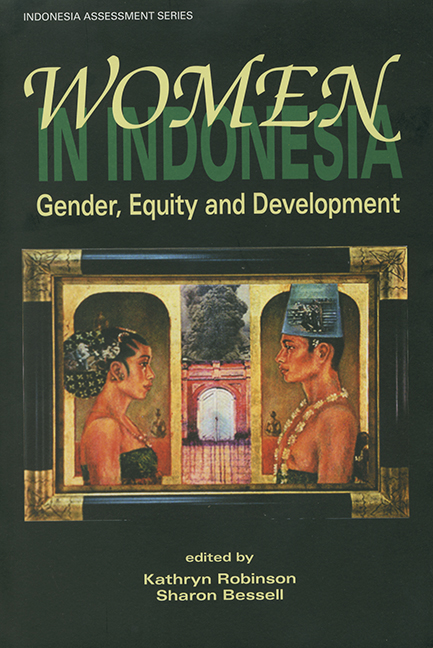Book contents
- Frontmatter
- Contents
- Tables
- Figures
- Contributors
- Acknowledgments
- Glossary
- Prologue
- 1 Introduction to the Issues
- 2 The Mega Factor in Indonesian Politics: A New President or a New Kind of Presidency?
- 3 The Downfall of President Abdurrahman Wahid: A Return to Authoritarianism?
- 4 The Year in Review: From Blind Man's Bluff to Mega Expectations
- 5 Further Comments on the Economy, with a Gender Perspective
- 6 Institution Building: An Effort to Improve Indonesian Women's Role and Status
- Commentary
- 7 Feminism in Indonesia in an International Context
- 8 Gay and Lesbi Subjectivities, National Belonging and the New Indonesia
- 9 And the Winner Is … Indonesian Women in Public Life
- 10 Indonesian Women Artists: Transcending Compliance
- 11 Literature, Mythology and Regime Change: Some Observations on Recent Indonesian Women's Writing
- 12 Women and the Labour Market during and after the Crisis
- 13 Women's International Labour Migration
- 14 Customary Institutions, Syariah Law and the Marginalisation of Indonesian Women
- 15 Women's Grassroots Movements in Indonesia: A Case Study of the PKK and Islamic Women's Organisations
- 16 Women's Activism against Violence in South Sulawesi
- 17 Gender Mainstreaming and Sex-disaggregated Data
- 18 The Changing Indonesian Household
- 19 Women, Family Planning and Decentralisation: New Variations on Old Themes
- 20 Men, Women and Community Development in East Nusa Tenggara
- References
- Index
- INDONESIA ASSESSMENT SERIES
20 - Men, Women and Community Development in East Nusa Tenggara
Published online by Cambridge University Press: 21 October 2015
- Frontmatter
- Contents
- Tables
- Figures
- Contributors
- Acknowledgments
- Glossary
- Prologue
- 1 Introduction to the Issues
- 2 The Mega Factor in Indonesian Politics: A New President or a New Kind of Presidency?
- 3 The Downfall of President Abdurrahman Wahid: A Return to Authoritarianism?
- 4 The Year in Review: From Blind Man's Bluff to Mega Expectations
- 5 Further Comments on the Economy, with a Gender Perspective
- 6 Institution Building: An Effort to Improve Indonesian Women's Role and Status
- Commentary
- 7 Feminism in Indonesia in an International Context
- 8 Gay and Lesbi Subjectivities, National Belonging and the New Indonesia
- 9 And the Winner Is … Indonesian Women in Public Life
- 10 Indonesian Women Artists: Transcending Compliance
- 11 Literature, Mythology and Regime Change: Some Observations on Recent Indonesian Women's Writing
- 12 Women and the Labour Market during and after the Crisis
- 13 Women's International Labour Migration
- 14 Customary Institutions, Syariah Law and the Marginalisation of Indonesian Women
- 15 Women's Grassroots Movements in Indonesia: A Case Study of the PKK and Islamic Women's Organisations
- 16 Women's Activism against Violence in South Sulawesi
- 17 Gender Mainstreaming and Sex-disaggregated Data
- 18 The Changing Indonesian Household
- 19 Women, Family Planning and Decentralisation: New Variations on Old Themes
- 20 Men, Women and Community Development in East Nusa Tenggara
- References
- Index
- INDONESIA ASSESSMENT SERIES
Summary
Poor communities in geographically remote areas of Indonesia have been neglected both by local and national authorities and by aid agencies, and have hence developed specific self-reliance strategies. However, their local resources are limited and intervention by outsiders has become crucial to development within these communities.
This chapter discusses the ten-year, community-based development experience in Semau and other parts of East Nusa Tenggara of the Nusatenggara Association Incorporated (NTA), an Australian non-government organisation (NGO). It reveals how a key activity proposed initially by informal leaders to outsiders led to multiple development activities spread throughout several communities, attracting increasing community participation. It demonstrates what outsiders can provide in terms of technical advice, supported by limited funds, to materially poor and isolated communities living in subsistence conditions in a harsh environment where rainfall is uncertain and food security crucial.
Indonesia has, since the implementation of its first Five-year Development Plan (Repelita I, 1969–74), undertaken vast integrated development efforts in the major sectors. These endeavours were supported by bilateral and multilateral cooperation through the relevant government departments. The goals of the Indonesian government were to achieve economic stability through poverty alleviation and improvements in people's quality of life. Since the early 1990s it has given priority to development in eastern Indonesia, an emphasis justified by the region's annual per capita income of just A$156 (approximately US$78) per head in 1995 – the lowest in Indonesia (Kantor Statistik BPS Propinsi NTT: 442).
Indonesians and foreign donors have increasingly realised that a centralised approach to delivering development packages in designated communities has little relevance to local needs. The intended beneficiaries were often scarcely consulted, and local participation rarely went beyond the employment of contract workers. The centralised, top-down approach did not foster a sense of belonging and accountability among the beneficiaries. Project authorities dealt primarily with provincial and regency officials rather than working directly at the subdistrict (kecamatan) or village (desa) level, and development activities were operational only during the life span of the project. There were few systems in place to ensure the ongoing maintenance or sustainability of activities established through external inputs.
Aid donors have always faced the challenge of ensuring adequate local participation. In the current environment of otonomi daerah (regional autonomy), whereby authority and responsibility for local development have been substantially decentralised, the challenges are new and greater.
- Type
- Chapter
- Information
- Women in IndonesiaGender, Equity and Development, pp. 250 - 263Publisher: ISEAS–Yusof Ishak InstitutePrint publication year: 2002



